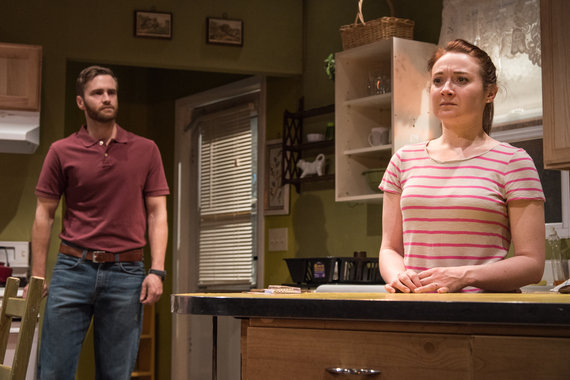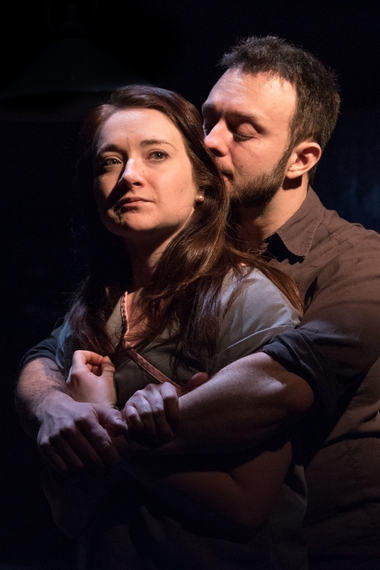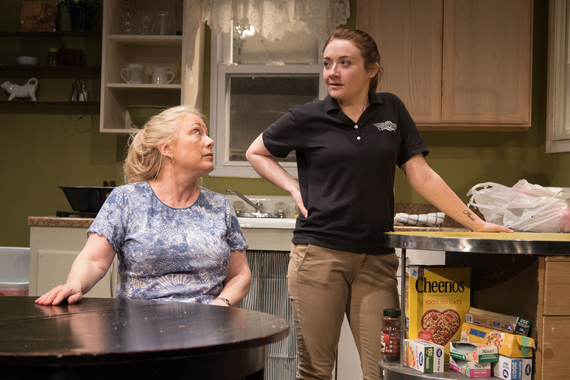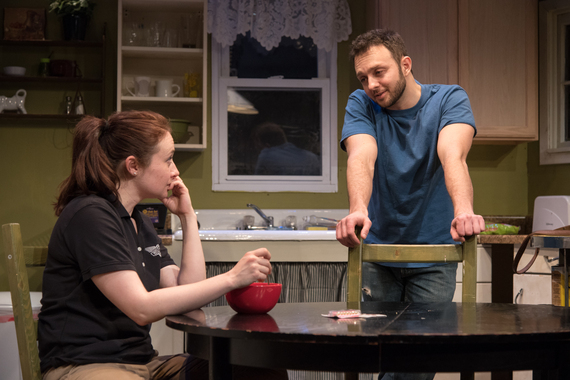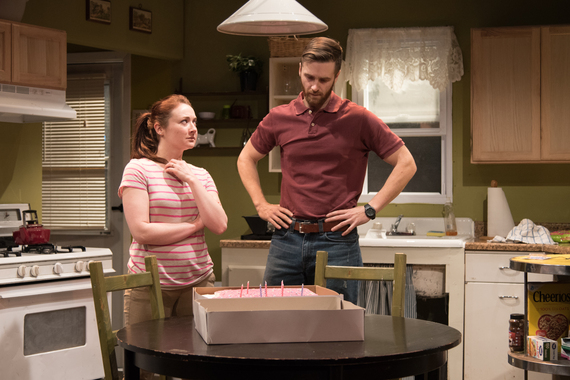There's something markedly incongruous about watching Utility, the new play by Emily Schwend, at the Rattlestick Playwrights Theater. The theater is located on Waverly Place in Greenwich Village, one of the most lively neighborhoods in downtown Manhattan. Something exciting, or at least interesting, is usually happening 24/7. When the set pieces for Utility are unveiled, it transports the audience to a very different atmosphere. Despite some clues (the children's school artwork on the fridge, the vintage cow-shaped milk dispenser...), it's difficult to place the locale or even the time period as the audience waits for the show to begin. Before we even meet the characters, however, one thing's for certain: We are clearly far away from the bustling scenario of New York City. The audience soon learns that Utility takes place in a semi-rural, recently water-damaged house in East Texas, and it's the home of working mother Amber (Vanessa Vache). It was also formerly the home of her estranged husband Chris (James Kautz). As the couple interact, we find out that they have been enduring an on-again, off-again relationship -- and the signs of frustration are clear within both of them. Exhausted Amber has two jobs, Chris is chronically unemployed or underemployed, and there are three children. Amber is planning a big birthday party for their eight-year-old daughter. It should be a happy occasion, but it just means more stress for the already spent Amber. Through the first of many exquisite scenes of "wordless acting" by Ms. Vache, it's clear that this mom is suffering much more than her superficially charismatic but seemingly unmotivated husband. When Amber stares into space (and thus into the audience), her desperation is clearly palpable. While this fractured family doesn't live in abject poverty, it's a tense situation where there isn't even 25 dollars available to pay the utilities bill. Later on, that unpaid bill gives way to the central impetus of Utility-- hence the play's title.
Another character, Jim (Chris' older brother, played by Alex Grubbs) soon enters the picture. In contrast to the high emotions of Vache's Amber (shown both through her words and through her expressions), Jim is a stoic type, with his character offering mostly minimal pieces of dialogue delivered in blunt monotone. It's about this point in Utility that the audience wonders just where the play is going... but in the meantime, to make the picture complete, we meet Amber's middle-aged mother Laura (played perfectly by Melissa Hurst), who-- with her working-class-style priggishness-- can best be described as, well... a "pill." The realistic mother-daughter interactions are the equivalent of watching an old married couple bicker in public: not so much fun for the couple, but amusing for an outsider to watch. The play's climax comes when the electricity goes out, causing a domino-like effect of things going wrong. It's all exacerbated by the oppressive Texas heat which the characters constantly comment about.
The central character, Amber, is on stage nearly the entire run of Utility, and she bears most of the emotional weight of the play. It's a challenge that Vanessa Vache meets very well. The actor's infinitely expressive eyes seem to constantly be yearning for something better. The others-- Amber's ne'er do well husband Chris, her mother Laura, and her brother-in-law Jim-- don't seem to be as affected by the weekend's stressors as much as Amber. Yet, their roles are also supremely acted, and their characters are definitely NOT caricatures. Amber and Jim get a moment alone together, and Amber vocalizes one of the tenets of her frustration in a pivotal statement: "It ain't fair. Ain't fair that he (Chris) is gonna go through his life being the same guy he always is, same guy he always was, but I gotta go through my life... like, I gotta lose just about everything I used to like about myself just so I can keep shit even halfway decent for everyone else around here." Jim then gets a chance to deliver a monologue where we speculate that his aura of deadpan disinterest may only be a survival mechanism for dealing with the difficulties of making it as a blue collar worker in a small Southern town. As Grubbs' Jim reminisces, we get yet another example of Vache's skilled wordless acting that I mention before...
The conclusion of Utility comes when the long, hot, slow weekend closes... and the question for the audience becomes "Now what?" Will Amber suffer a nervous breakdown, in concurrent symbolism with the power outage? Will she send Chris out of her life for good? Or will she stay with him? The ending is not be the punch-style reward that some audience members may want after the protracted (Some may say a bit too protracted...) pace of the play. Still, no one can argue that the final scene is very plausible. No matter what, we certainly can't judge Amber or any of the other characters in Utility for their actions. By the end of the play, we may or may not care about them. We may or may not relate to them. However, we can certainly understand why they are the way they are.
Utility is presented by The Amoralists and is directed by Jay Stull. The play continues through February 20th, 2016 at Rattlestick Playwrights Theater, 224 Waverly Place, NYC. Visit www.Rattlestick.org/Utility for more information.
Photos by Russ Rowland

